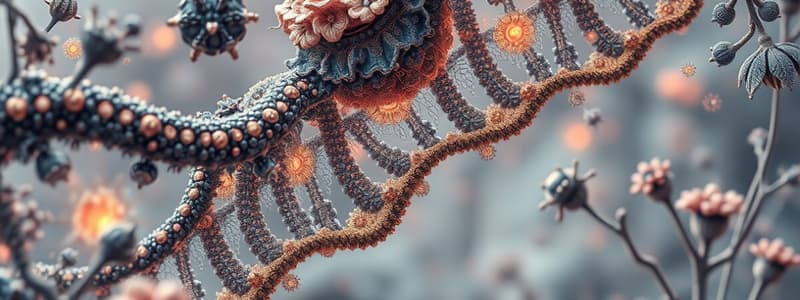Podcast
Questions and Answers
Which of the following is an application of biotechnology in medicine?
Which of the following is an application of biotechnology in medicine?
- Gene therapy (correct)
- Waste management
- Production of biofuels
- Genetically modified crops
CRISPR is a technique used in environmental science for assessing climate change.
CRISPR is a technique used in environmental science for assessing climate change.
False (B)
What does 'Narrow AI' refer to?
What does 'Narrow AI' refer to?
AI specialized for specific tasks.
The study of interactions between organisms and their environments is known as ______.
The study of interactions between organisms and their environments is known as ______.
Match the following biotechnological techniques with their uses:
Match the following biotechnological techniques with their uses:
Which of the following is NOT a key area of Environmental Science?
Which of the following is NOT a key area of Environmental Science?
Machine Learning is a key concept in Artificial Intelligence.
Machine Learning is a key concept in Artificial Intelligence.
What is one application of Artificial Intelligence in healthcare?
What is one application of Artificial Intelligence in healthcare?
The primary goal of ______ biology is to protect biodiversity and ecosystems.
The primary goal of ______ biology is to protect biodiversity and ecosystems.
Match the following fields with their definitions:
Match the following fields with their definitions:
Study Notes
Biotechnology
- Definition: The use of biological systems or organisms to develop or create products.
- Applications:
- Medical: Production of vaccines, gene therapy, and pharmaceuticals.
- Agricultural: Genetically modified organisms (GMOs) for improved crop yield and resistance to pests.
- Industrial: Bioprocessing and biofuels production.
- Techniques:
- Recombinant DNA: Combining DNA from different organisms.
- CRISPR: Gene-editing technology for precise modifications.
- Fermentation: Use of microorganisms for product formation.
Environmental Science
- Definition: The study of the environment and the solution of environmental problems.
- Key Areas:
- Ecology: Interactions between organisms and their environments.
- Conservation Biology: Protecting biodiversity and ecosystems.
- Climate Science: Understanding climate change and its impacts.
- Techniques:
- Sustainability Practices: Renewable energy, waste management, and resource conservation.
- Environmental Impact Assessments (EIA): Evaluating the potential environmental effects of proposed projects.
- Remote Sensing: Using satellite or aerial imagery to gather data about the Earth's surface.
Artificial Intelligence
- Definition: The simulation of human intelligence in machines programmed to think and learn.
- Types:
- Narrow AI: Specialized for specific tasks (e.g., speech recognition).
- General AI: Hypothetical AI that can perform any intellectual task a human can do.
- Applications:
- Healthcare: Diagnostic tools, personalized medicine, and robotic surgery.
- Finance: Algorithmic trading, fraud detection, and risk management.
- Transportation: Autonomous vehicles and traffic management systems.
- Key Concepts:
- Machine Learning: Algorithms that improve from data over time.
- Natural Language Processing (NLP): Enabling machines to understand and respond to human language.
- Neural Networks: Models inspired by the human brain, used in deep learning.
Biotechnology
- Utilizes biological systems or organisms to create products.
- Medical Applications: Involves the development of vaccines, gene therapy, and pharmaceuticals to enhance human health.
- Agricultural Applications: Development of genetically modified organisms (GMOs) aimed at increasing crop yields and enhancing pest resistance.
- Industrial Applications: Encompasses bioprocessing and production of biofuels for sustainable energy solutions.
- Recombinant DNA Technology: Method of merging DNA from various organisms to produce desired traits or products.
- CRISPR Technology: Advanced gene-editing tool allowing precise alterations in DNA sequences for various applications.
- Fermentation: Utilizes microorganisms in the conversion of substrates into valuable products, such as alcohol and organic acids.
Environmental Science
- Focuses on the study of the environment and strategies for addressing environmental challenges.
- Key Areas:
- Ecology: Examines organism interactions within their environments, crucial for understanding ecosystem dynamics.
- Conservation Biology: Aims to protect biodiversity and maintain healthy ecosystems.
- Climate Science: Investigates climate change phenomena and global environmental impacts.
- Techniques:
- Sustainability Practices: Incorporates renewable energy solutions, efficient waste management, and conservation of natural resources.
- Environmental Impact Assessments (EIA): Process for evaluating the potential environmental effects of proposed development projects before execution.
- Remote Sensing: Employs satellite or aerial imagery to collect data on Earth's surface features and changes.
Artificial Intelligence
- Defined as the capability of machines to simulate human intelligence, learning, and thinking processes.
- Types of AI:
- Narrow AI: Specialist systems designed for specific tasks, such as speech recognition.
- General AI: Theoretical AI expected to comprehend and conduct any intellectual task akin to human abilities.
- Applications:
- Healthcare Sector: Implements diagnostic tools, personalized medical treatments, and robotic surgical technologies.
- Finance Sector: Utilizes algorithmic trading, fraud detection mechanisms, and risk management strategies.
- Transportation: Involves the development of autonomous vehicles and systems for managing traffic flow efficiently.
- Key Concepts:
- Machine Learning: Refers to algorithms that enhance their performance through accumulated data experiences.
- Natural Language Processing (NLP): Facilitates machine comprehension and interaction using human language.
- Neural Networks: Computational models inspired by the human brain, foundational in the field of deep learning for advanced data processing.
Studying That Suits You
Use AI to generate personalized quizzes and flashcards to suit your learning preferences.
Description
Test your knowledge on biotechnology and environmental science, exploring key concepts, applications, and techniques. This quiz covers various topics including medical advancements, agricultural practices, and ecological principles. Challenge yourself and see how well you understand these vital fields of study.




